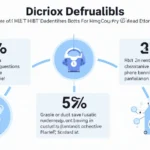2025 Blockchain Security Standards: A Comprehensive Guide for Digital Asset Protection
In 2024, the crypto world lost an astonishing $4.1 billion to DeFi hacks, highlighting the urgent need for robust security measures. With the rapid adoption of digital currencies in Vietnam and a user growth rate of 49% year-on-year, ensuring the safety of crypto payments has never been more critical. This article will provide an in-depth look at Vietnam’s crypto payment security protocols and what platforms like Bitcryptodeposit must consider for safeguarding digital assets.
Understanding Crypto Payment Security Protocols
At its core, crypto payment security protocols are designed to protect transactions and personal data from unauthorized access and fraud. The rise of cyber threats means that understanding these protocols is essential for users and platform operators alike.
- Protocols help ensure that cryptographic transactions remain private and secure.
- They mitigate risks associated with hacking and fraud.
- Employing advanced standards protects both user assets and platform integrity.
1. Encryption Mechanisms
Encryption is the cornerstone of any blockchain security strategy. It ensures that user data remains confidential through cryptographic algorithms. Here’s how encryption functions:

- Public-Key Infrastructure (PKI): This system allows users to share their public keys securely while keeping their private keys confidential.
- Hashing: Transactions are transformed into fixed-length strings, securing data integrity by making it nearly impossible to reverse-engineer.
If you’re using a blockchain-based payment platform, ensuring strong encryption should be one of your top priorities.
2. Consensus Mechanism Vulnerabilities
Consensus mechanisms help validate transactions. Various systems, such as Proof of Work and Proof of Stake, have their own vulnerabilities:
- Proof of Work (PoW): This method is energy-intensive and can lead to centralization if large mining pools dominate.
- Proof of Stake (PoS): Although energy-efficient, it can limit user participation and lead to potential centralization.
Ensuring consensus mechanisms are regularly audited can prevent future vulnerabilities.
3. Smart Contract Security
Smart contracts run on the blockchain and automate transactions. However, they are not foolproof:
- Common vulnerabilities include:
- Reentrancy attacks
- Gas limit issues
- Integer overflow and underflow
Involving third-party auditors for smart contract checks is crucial. Many platforms are successfully reducing risks by following meticulous auditing procedures.
Vietnam’s Crypto Landscape and Growth
With Vietnam’s cryptocurrency market rapidly expanding, several data points illustrate this growth:
- The country has over 5 million cryptocurrency users.
- Vietnam ranks among the top countries in DeFi project engagement, confirming the immense potential for growth in crypto payments.
Given these figures, securing cryptocurrency payments has become paramount for local platforms. Utilizing local security standards, or tiêu chuẩn an ninh blockchain, can foster greater user trust and engagement.
4. Regulatory Compliance
In Vietnam, regulatory landscapes influence how crypto platforms operate:
- Mandatory KYC and AML compliance to prevent fraud.
- Licensure expectations from the State Bank of Vietnam can help legitimize operations.
Maintaining compliance with local regulations not only enhances security but can also improve user confidence.
Best Practices for Securing Crypto Payments
Implementing thorough security practices can drastically mitigate risks:
- Regular Security Audits: Schedule consistent audits to identify potential weaknesses.
- Multi-Factor Authentication: Always use multi-factor authentication for user accounts.
- Cold Storage: Keeping a majority of funds in cold storage reduces the risk of hot wallet attacks.
Platforms need to adopt a proactive mindset toward security, akin to how banks prioritize vault protection for physical cash.
5. The Future of Crypto Payment Security in Vietnam
The future looks promising yet challenging. As adoption increases, cyber threats will evolve, calling for ongoing enhancement of security measures:
- Emergent technologies, such as quantum encryption, might reshape the security landscape.
- Investing in human resources for cybersecurity can build stronger defenses against potential breaches.
Ultimately, innovations and adaptability will define the effectiveness of crypto payment security in Vietnam.
Conclusion
As Vietnam continues to embrace crypto, understanding its payment security protocols becomes essential. By prioritizing robust encryption, regular audits, and compliance with tiêu chuẩn an ninh blockchain, platforms can ensure a safer user experience. As we move towards 2025, keeping informed about effective practices will equip both users and platforms to navigate the blockchain landscape securely.
For more insights, visit Bitcryptodeposit.
Authored by: Dr. Nguyen Van Thanh, an esteemed blockchain expert with over 40 published papers and a leader in numerous high-profile audit projects.







